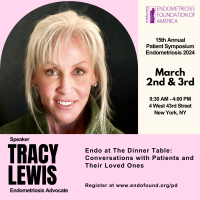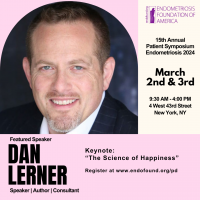
By Tamer Seckin, MD.

My thoughts are with Lena Dunham, who recently expressed the pain she is suffering due to endometriosis. It is important that we speak honestly about the kind of pain endometriosis produces, as the disease is one that has been stigmatized and silenced for years. It is also important that the public has the appropriate information to understand endometriosis and the various options available.
Endometriosis is a disease affecting 1 in 10 women of childbearing age (from her first period until menopause) and it is the primary cause of pelvic pain and one of the leading causes of female infertility.
Endometriosis originates in the female reproductive system and can spread to other organs. Many women have endometriosis but don’t know they have it because the symptoms mimic other conditions including irritable bowel syndrome, appendicitis, fibroids, diverticulitis, pelvic inflammatory disease.
The symptoms of endometriosis can be very difficult for a woman, particularly a young woman, to recognize. Often the disease goes undiagnosed for years, only to be discovered when a patient presents with infertility or her symptoms become very severe.
Endometriosis is a treatable disease through deep excision surgery and many women who undergo the surgery can reclaim their lives and live pain-free. Unfortunately, many doctors prescribe short-term solutions like drugs, painkillers, and hormones that only mask the symptoms and do not treat the underlying disease.
There is an overall lack of awareness in the medical community about the complexity of this disease and for that reason it is crucial to know that hysterectomy is not a definitive choice for treatment. I want to be clear that if any endometriosis is left behind after a hysterectomy a woman will still suffer with symptoms and pain. The complexity in treating this disease is that a surgeon MUST be able to recognize the disease in order to remove it.
Trusting your doctor is of vital importance. But well-intended doctors who are NOT experts in diagnosing or treating endometriosis will not be able to help you. Inappropriate surgical procedures by medical professionals who lack experience in recognizing the disease are the main reasons for disease reoccurrence. Trust your doctor but trust yourself and your pain more. You must be your own advocate. If your doctor’s diagnosis doesn’t seem right to you, then you are the one who is probably right. You should always seek a second opinion with an endometriosis specialist.
Before seeing a specialist, it is important to gather as much information and medical history as possible, including medical records from previous physicians' treatments. Try to articulate your symptoms, concerns, and fears and be specific. How much pain do you have on an average day, and how often? Does the pain come and go? What alleviates the pain? How upsetting and disrupting is the pain to you? Do specific activities trigger your pain? Does pain interfere with your daily activities or personal routine? Don't be afraid to ask questions. Please tell your doctor if you have painful bowel movements, pain with sex, constipation, problems urinating after sex or the next day, back pain and leg pain with periods, and pain that radiates to other parts of the body. Don’t be afraid to ask questions or to tell you doctor the details of your symptoms. The symptoms that you think might not be important often times will lead your surgeon to the specific tissue where the disease has settled.
When seeking a specialist you should look for a doctor who specializes in the treatment of endometriosis and find out what percentage of their patients are young women and girls. Does the doctor have experience diagnosing and treating the disease? What is the doctor's attitude about your role in your health care? Is he or she willing to receive input from you? Do they allow ample time for thorough conversation and examination, or do they rush? Are they able to explain surgical procedures and treatment options clearly in terms you understand?
What to consider when discussing treatment options:
- Always ask about all available treatment/management options including surgical and medical. Choose the approach you feel most comfortable with and is best suited to your lifestyle.
- When discussing medical treatments, ask the doctor to explain exactly what each prescription is for. For instance, is it for pain relief, or for hormonal suppression? Also, ask about risks, side effects, and drug interactions. Be certain to understand the duration of intended treatment and schedule follow-up appointments to monitor results.
What to consider when discussing surgical treatment
- How does the doctor plan to use surgery to treat endometriosis? Do they specialize in laparoscopy (does the surgeon plan to use laser burn) or surgically excise (cut out) endometriosis tissue?
- Will your surgery be documented with images?
- How clearly are they able to explain the procedure? What exactly will be done during the surgery? For example, will endometriosis be removed? Or, will it be an exploratory (look-only) surgery? If so, why?
- Is the doctor affiliated with a hospital that regularly treats endometriosis? Do they have a "team" of surgeons established to address different elements of surgical treatment? Will your doctor have other surgeons (general, colorectal, etc.) in the operating room with them?
- What can be expected after the surgery? How much pain should you expect post-operatively? How can you lessen the pain? What are post-op restrictions for going back to school or work? Learn how to prepare yourself and your body for the surgery.
- Make sure that the doctor provides images and a video clip of before and after the procedure.
- Does the doctor work with a dedicated team of specialists who treat endometriosis and who can assist when the disease has migrated to other organs? When other organs are involved like bowel, bladder, and ureter – is the skill level of the assisting doctor up to par to fine suture organs that require the precision of a reconstructive surgeon?
Be sure to ask your doctor's office for a pre-op and post-op routine to assist in your healing process.
Never rule out a second opinion...or a third! There is a solution to your pain and the more you know, the better equipped you will be in handling endometriosis.
Dr. Tamer Seckinis an internationally renowned specialist exclusively treating endometriosis. He is one of the few accredited gynecologic surgeons in the United States, who has advanced training in the deep laparoscopic excision of endometriosis. He has dedicated his life to the understanding and treatment of this disease, leading him to found the Endometriosis Foundation of America (Endofound) with Padma Lakshmi. Dr. Seckin is affiliated with Lenox Hill Hospital in New York City, part of the Northwell Health System.







